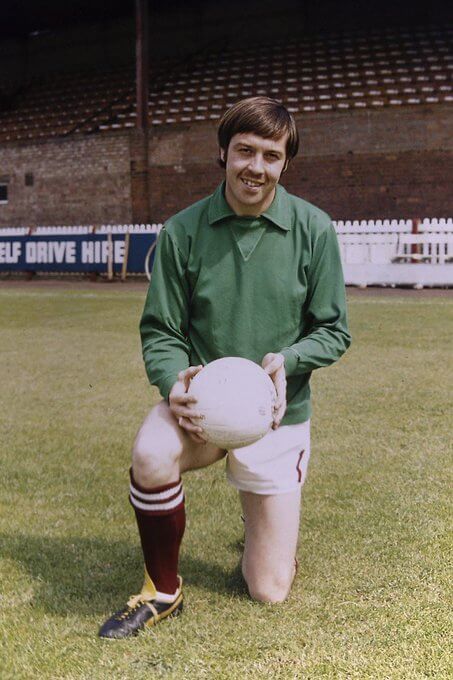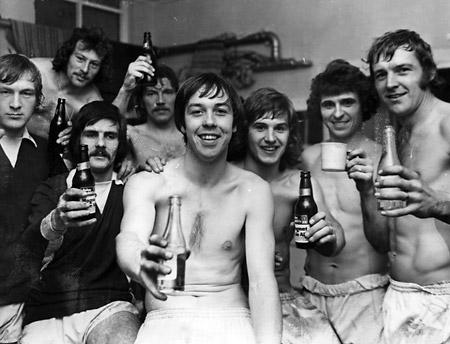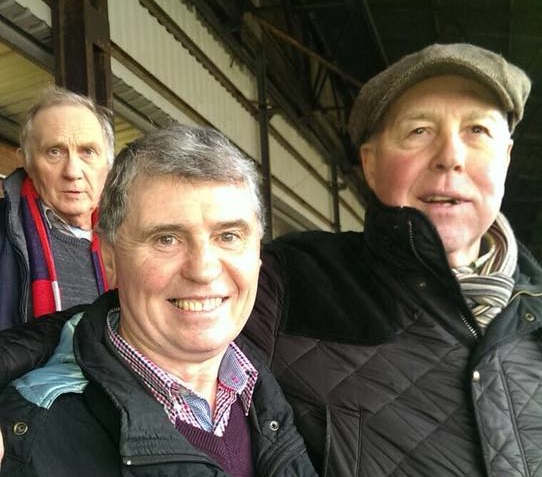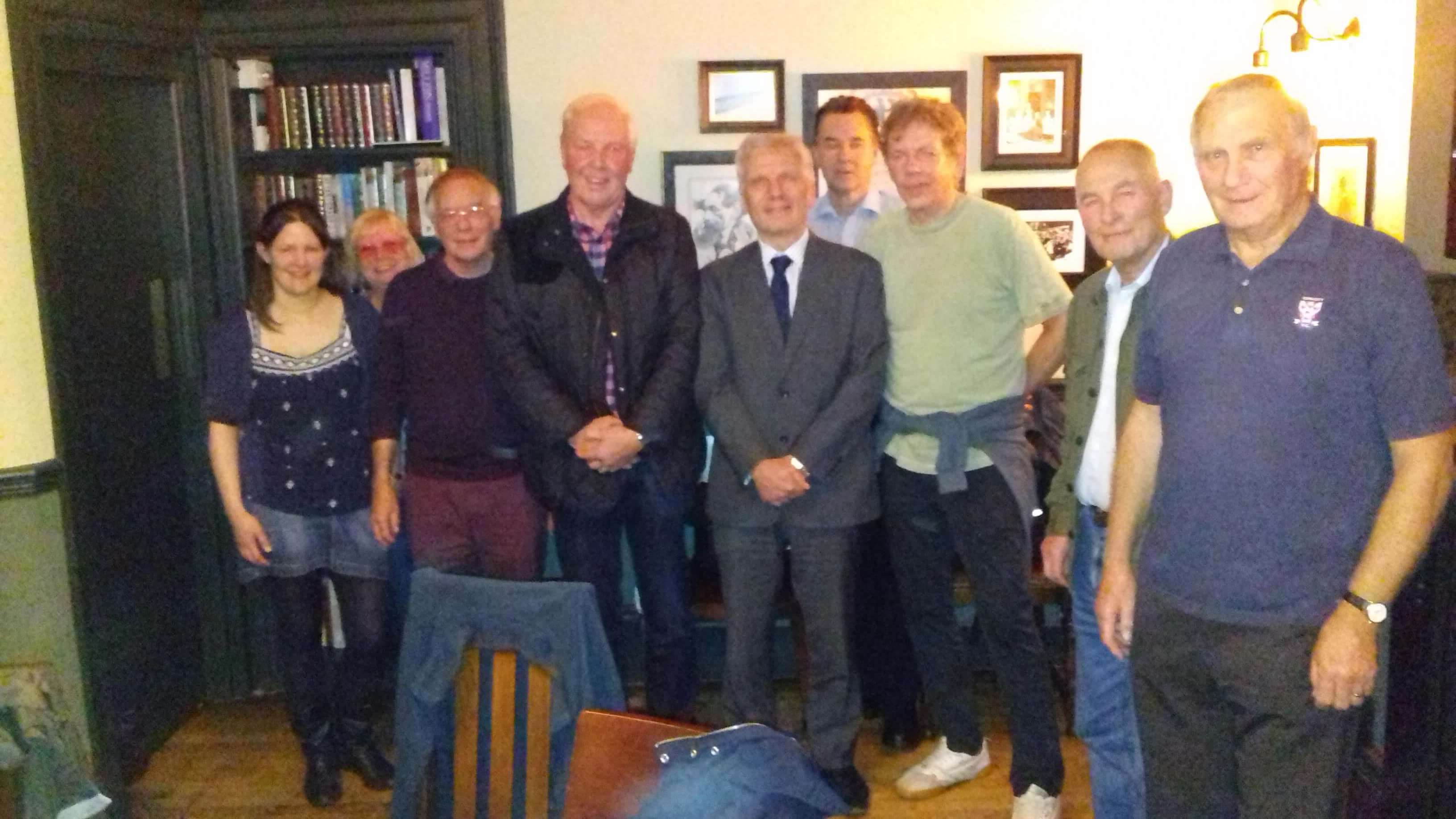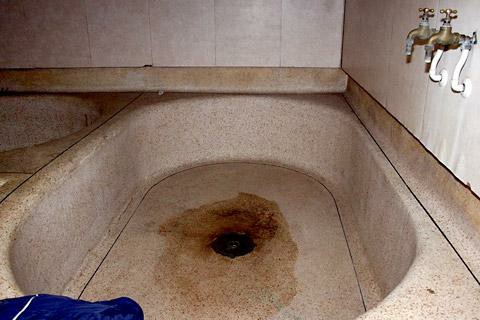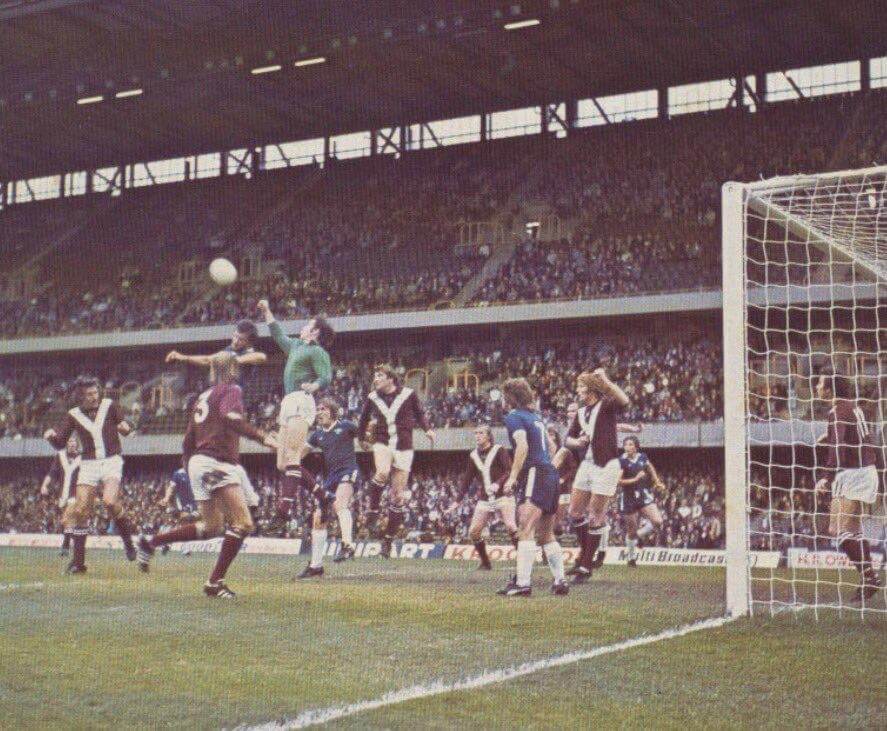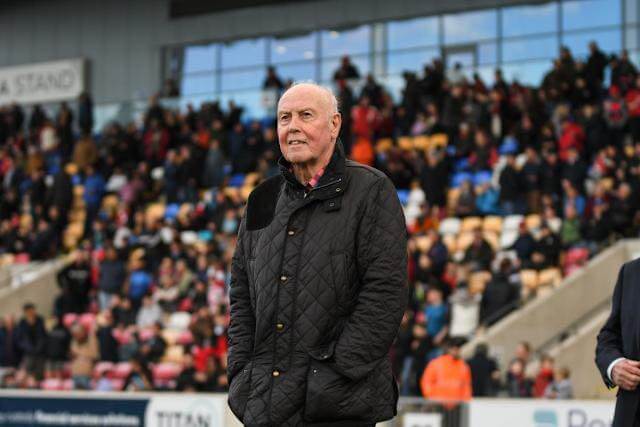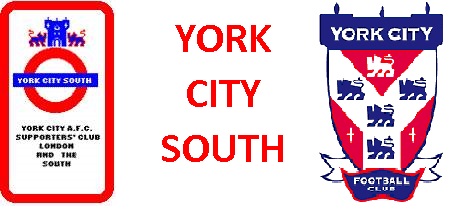

Graeme Crawford
Graeme Crawford had 2 spells with City. Originally signed on loan, his first 2 seasons saw City survive Division 3 (now Division 1) on goal average. The next season, he (although he'd definitely credit the whole of the back 4) equalled a Football League record of 11 successive clean sheets as City won promotion in 1974 to what is now known as The Championship (Division 2) for the only time, to date, in our history. Read more on the 11 game record.
With Graeme in goal, City initially held their own in a higher division. But after Tom Johnston left, Wilf McGuinness
' side struggled and we endured successive relegations in 1976 and 1977. Graeme and Chris Topping were City’s only 2 ever presents in our 2 seasons in Division 2.
Graeme left for Scunthorpe in 1977, before returning 3 years later. Later, a change of manager, with former teammate Barry Lyons
assuming the role saw the end of his City career. Crawford felt distanced by Lyons (something that Lyons acknowledged in April 2022 when the 73/4 team were re-united at the LNER, citing that he felt the shift from "Baz" to "Boss" would cause senior players some difficulty with Lyons more or less cutting himself off from City and former teammates in the interim after his time with City came to a messy end). For Crawford, a spell at Rochdale and then non league football followed. First with Scarborough and later at Goole, when at the age of 42 came out of retirement to play an FA Cup tie. As his career wound down, Crawford played at a lower level, including as he recalled, "on reflection it would have been about 84-85 that I left (Northallerton) Town. A load of us had left and formed Brompton Albion but that merged with Town after 2-3 seasons" playing alongside various ex City teammates including Chris Topping.
He was Radio York's original City co-commentator. Still living in York, in 2017, he said that he is not a great watcher but did still see occasional City matches and keeps in touch with many of his 1974 promotion colleagues. later, with a young grandson, he was a regular visitor to the LNER and a season ticket holder.
More (1): How does Graeme rank amongst City's best ever keepers.
More (2): Graeme's 2006 interview with Phil Howden.
More (3): Graeme on York Hospital Ball
YCS Guest - Graeme Crawford The following is taken from October 19th 2017 when Graeme was guest speaker at York City South's social evening. One of City’s all time best keepers, Graeme Crawford was York City South’s guest speaker on 19th October 2017. Accompanied by his son, Peter, Graeme spent a lively 2 hours plus regaling us of his career in football. Graeme's Dad was a council labourer and his Mum was a nurse. The family lived in a council house. After leaving school as soon as he could, he wasn’t playing much proper football until a friend asked him to play in goal when aged about 15 when they were short (he previously played at right back). A successful trial at junior side Bo’ness United, based halfway between Falkirk, his birthplace and Edinburgh, soon followed. In those days, Scottish junior football (effectively open age non league football) was strong and players regularly progressed into the professional game, on both sides of the border. Towards the end of his first season, he was asked to play a midweek trial game for East Stirlingshire, Falkirk's second team. Called in the next day, he signed a contract and made his first team debut that weekend against St Mirren and kept his place for the next game, the last game of the season. One game he remembers is a pre season friendly against Falkirk when the opposing centre forward was Alex Ferguson.
One week in early August 1966, he and a bunch of young Scottish hopefuls were invited down to Anfield for a week long trial. Come Wednesday, manager Bill Shankly called the group together. He looked at Crawford, ”the best thing you can do is to go back to Glasgow now and you go can go home as well”, he said to the hopeful stood next to Crawford. Thus ended Kenny Dalglish’s first taste of Liverpool.
Early in 1968 summer, there was interest from south of the border. Shrewsbury, under Arthur Rowley, offered £10,000. Crawford, having only very rarely been out of Scotland, rejected the offer. By August, Arthur Rowley now manager at Sheffield United, just relegated from the top flight, made a new bid. Under pressure from his Dad (and East Stirlingshire who needed the transfer fee to pay for their new floodlights), Crawford signed for a fee in the region of £20,000. His wages were £28 a week with a £250 signing on fee spread over the 2 years of the contract. With Alan Hodgkinson (5 England caps) as first choice, his chances were limited. His progress was hindered by a car crash at Christmas when driving home resulting in over 50 stitches as he was flung through the windscreen.
He made his first team debut early in the 1969/70 season in a 1-0 win at Norwich. Graeme recalls playing 3 times in an Anglo Italian competition against Napoli (Dino Zoff was the opposing keeper), Bologna and Verona when Rowley left Hodgkinson at home to allow Crawford to gain first team experience.
After Rowley left, Crawford felt new manager, John Harris, didn't rate him, he was dropped to the 3rd team. A loan spell at Mansfield followed.
City’s 1971/2 return to the third flight started slowly, mistakes by Ron Hillyard didn’t help. As United progressed in the League Cup, they came up against City in Round 3. From the sidelines, Crawford was quietly impressed by City as we lost narrowly 3-2 to Sheffield United, newly promoted and flying in the top flight.
2 weeks later, City and Grimsby both enquired after him. He asked both managers the same question. Grimsby’s Lawrie McMenemy wanted Graeme to be reserve keeper, understudy to Harry Wainman. Tom Johnston replied, “sign today and you’ll play on Saturday”. For Crawford, it was no choice. Initially joining City on loan, he made his debut in a 2-0 defeat at Tranmere on November 5th, 1971. He found York to be a “great club, great lads” as he travelled daily up to York with Dick Hewitt and City’s south Yorkshire contingent. Shortly after the loan deal finished, Crawford joined City on a free transfer.
That season and the next season, City survived on goal average. 1973/4 saw City’s fortunes much improved. Promotion to Division 2 (now The Championship). Based on a solid defence, City comfortably earned promotion. Conceding only 38 league goals in the season, a club record at the time, and since only beaten in 2009/10.
It was just a few weeks later, promotion secured that Phil Burrows went to see Tom Johnston. Crawford believes Johnston didn’t like Burrows (Ed: Some think Johnston didn’t like any player!). At the end of his contract, he asked for rise. Johnston replied, “see that lemonade crate in the corner, stand on it”. Burrows left for Plymouth for "a single figure" pay rise. If only. The story resonates with the occasion when Crawford’s boots were completely worn out, Crawford got permission to get a new pair but Johnston reprimanded him, “Take your old laces, there’s nothing wrong with them”.
He recalls a game at Aston Villa. Their centre forward Andy Lochhead, a rugged Scottish centre forward, famed for his aerial power, roughed Graeme up at every corner during the first half. Despite complaining and moaning to the referee, Gordon Hill, a leading official of the time, Crawford got no joy. Come the second half, at an early corner, the ref said, “your turn son”, allowing Crawford a free hit at Lochhead. Happy days.
One his arrival at City, Wilf McGuinness’ first address to his players was, “I don’t think the side is good enough. I’ll have to bring a few players in”. Crawford believes, if coach Clive Baker had been promoted to manager, then City could have maintained our second tier status as the side had a strong basis.
Although he heard nothing officially, Crawford believes there was reputed interest in him from the Scottish national team. He had the chance to move to Southampton, by which time Lawrie McMenemy was their manager, he asked the same question as he’d asked him a few years earlier at Grimsby and got the same “understudy” reply. Crawford preferred to stay at York as first choice.
By the summer of 1977, after 2 relegations, Crawford wasn’t enjoying his football and threatened to retire (Ed: Reports at the time said he went on strike). He found it difficult to leave York City, but didn’t get on with Wilf McGuinness as a manager. His unhappiness with his football overcoming the strong camaraderie he felt with his City playing colleagues. He took a job outside football, selling printing and office stationery, in the summer.
Director Michael Sinclair asked him to come back and was later instrumental in his transfer to Scunthorpe. Crawford found manager, Ron Ashman to be the only straight forward manager he ever played for. He agreed wages and Ashman asked Crawford what he wanted as a signing on fee, Ashman telling him that was how lower league players made their money. He spent 2 and a half seasons at Scunthorpe in Division 4, being their player of the season in 1979 (an honour he never won with City). Towards the end of his time, Ashman suggested Crawford should go back to York. Graeme refused, not wanting to disappoint Ashman, only for Ashman to once again ask him to go back to York, “go Graeme, I’ve only 2 games left in charge if we don't win”. Crawford took heed and returned to York.
Back with City, he enjoyed his football under Charlie Wright and wished he’d been coached by the ex-keeper, who’d enjoyed a long and successful playing career, much earlier in his career. It was only under Wright that Crawford learned about angles and crosses and had proper keeper coaching. Previously his keeper training consisted of 20 minutes shot stopping at the end of a session in an era where goalies only wore gloves on wet days (green cotton gloves to avoid the wet ball slipping out of their hands), instead preferring to rub spit and beechnut chewing gum into their hands. His second spell with City wasn’t as successful as Barry Lyons replaced Wright and wanted a clean break and to make his own mark, exit Graeme Crawford.
He spent 3 years at Rochdale; many of his former City colleagues were teammates. He recalled one game against York. City won a penalty, he knew Derek Hood always put the ball hard, straight down the middle. He spoke to Hood, “I’m not moving”, Hood didn’t deviate from his usual routine, the ball striking Crawford’s chest and bouncing clear, out of the penalty area. Another Rochdale game that stands out is when he was sent off and went to sit in the dugout. The referee came across and told him he couldn't sit there. Crawford throw a bucket of water over him earning himself a 4 game ban and 6 weeks without wages.
Graeme later enjoyed a spell in non league football and at the age of 42 came out of retirement to play for Goole in an FA Cup tie.
He was also Radio York’s first ever York City co-commentator, working with Bill Hanrahan, Derm Tanner and Jon Champion.
Graeme related the story of his career with many amusing anecdotes from both on and off the field. For those of "a certain age" it was good to hear about the players and staff from that era.
The main thing that came through was the spirit of that team during the first half of the 1970s. They were not only a really good team, but a bunch of lads who got on well and even today still meet up once a year and keep in close touch with one another.
Graeme still lives in the York area, and although, as he himself says, "I'm not a good watcher", he keeps City close to his heart. Just as is the case with many supporters, Graeme is disappointed to know that City will soon have to leave Bootham Crescent as it is a place he has a great fondness for. Like us, it saddens him to see the club in its present position and believes there is something lacking in the club at the moment. He acknowledged the financial contribution of Jason McGill over many years.
Having suffered from cartilage trouble throughout his career, a subsequent knee operation sorted that out. Today, it is only his “keepers' fingers” which give his former profession away.
Throughout the evening, Graeme gave many more insights into his career and teammates, including:
Sadly, Graeme passed away on May 27th, 2025, aged 77. Obituary. The funeral service was held at York Crematorium on June 25 and was attended by many of his ex teammates, Barry Swallow and John Woodward included.
One of Graeme's last trips to the LNER came on April 13, 2024 when he and many other member of City's 1974 promotion side were guest of honours and were warmly applauded when they came onto the pitch.
